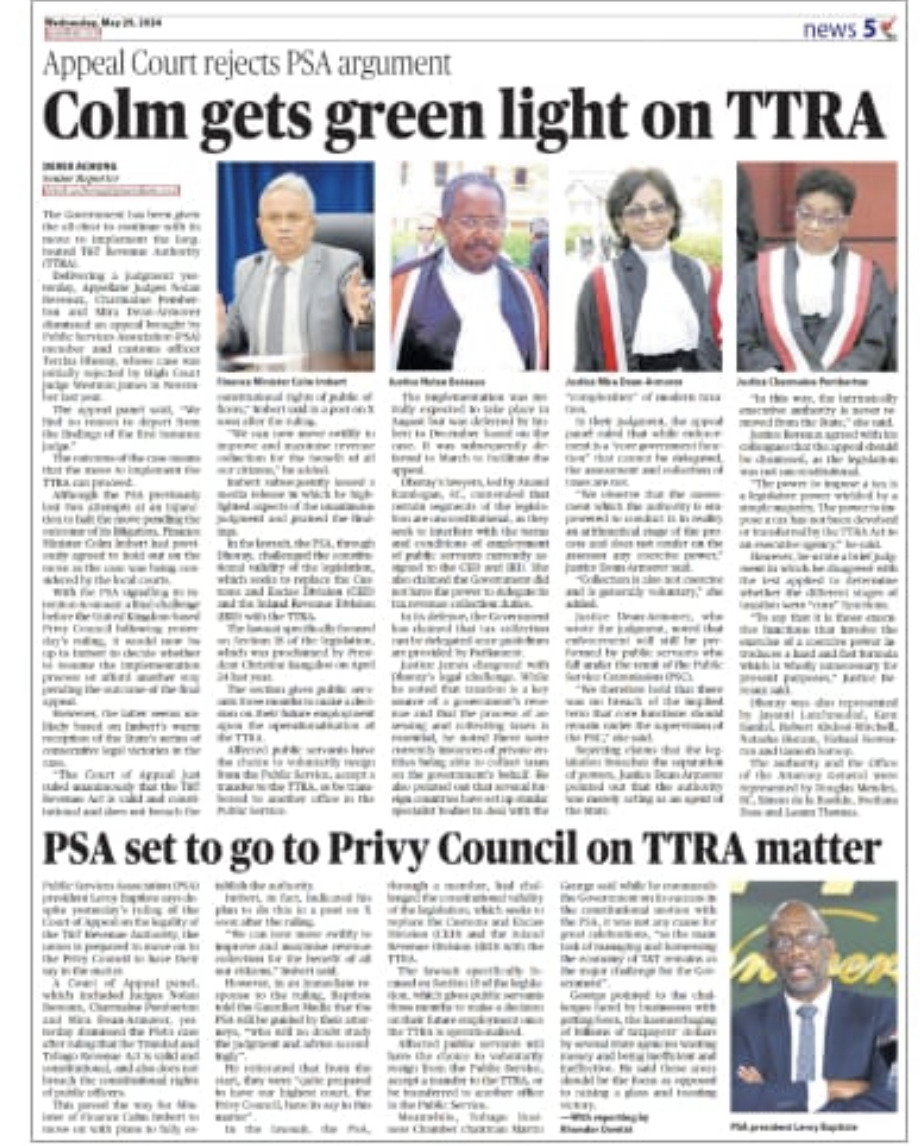Delivering a judgment yesterday, Appellate Judges Nolan Bereaux, Charmaine Pemberton and Mira Dean-Armorer dismissed an appeal brought by Public Services Association (PSA) member and customs officer Terrisa Dhoray, whose case was initially rejected by High Court Judge Westmin James in November last year.
The appeal panel said, “We find no reason to depart from the findings of the first instance judge.”
The outcome of the case means that the move to implement the TTRA can proceed.
Although the PSA previously lost two attempts at an injunction to halt the move pending the outcome of its litigation, Finance Minister Colm Imbert had previously agreed to hold out on the move as the case was being considered by the local courts.
With the PSA signalling its intention to mount a final challenge before the United Kingdom-based Privy Council following yesterday’s ruling, it would now be up to Imbert to decide whether to resume the implementation process or afford another stay pending the outcome of the final appeal.
However, the latter seems unlikely based on Imbert’s warm reception of the State’s series of consecutive legal victories in the case.
“The Court of Appeal just ruled unanimously that the T&T Revenue Act is valid and constitutional and does not breach the constitutional rights of public officers,” Imbert said in a post on X soon after the ruling.
“We can now move swiftly to improve and maximise revenue collection for the benefit of all our citizens,” he added.
Imbert subsequently issued a media release in which he highlighted aspects of the unanimous judgment and praised the findings.
In the lawsuit, the PSA, through Dhoray, challenged the constitutional validity of the legislation, which seeks to replace the Customs and Excise Division (CED) and the Inland Revenue Division (IRD) with the TTRA.
The lawsuit specifically focused on Section 18 of the legislation, which was proclaimed by President Christine Kangaloo on April 24 last year.
The section gives public servants three months to make a decision on their future employment upon the operationalisation of the TTRA.
Affected public servants have the choice to voluntarily resign from the Public Service, accept a transfer to the TTRA, or be transferred to another office in the Public Service.
The implementation was initially expected to take place in August but was deferred by Imbert to December based on the case. It was subsequently deferred to March to facilitate the appeal.
Dhoray’s lawyers, led by Anand Ramlogan, SC, contended that certain segments of the legislation are unconstitutional, as they seek to interfere with the terms and conditions of employment of public servants currently assigned to the CED and IRD. She also claimed the Government did not have the power to delegate its tax revenue collection duties.
In its defence, the Government has claimed that tax collection can be delegated once guidelines are provided by Parliament.
Justice James disagreed with Dhoray’s legal challenge. While he noted that taxation is a key source of a government’s revenue and that the process of assessing and collecting taxes is essential, he noted there were currently instances of private entities being able to collect taxes on the government’s behalf. He also pointed out that several foreign countries have set up similar specialist bodies to deal with the “complexities” of modern taxation.
In their judgment, the appeal panel ruled that while enforcement is a “core government function” that cannot be delegated, the assessment and collection of taxes are not.
“We observe that the assessment which the authority is empowered to conduct is in reality an arithmetical stage of the process and does not confer on the assessor any coercive power,” Justice Dean-Armorer said.
“Collection is also not coercive and is generally voluntary,” she added.
Justice Dean-Armorer, who wrote the judgment, noted that enforcement will still be performed by public servants who fall under the remit of the Public Service Commission (PSC).
“We therefore hold that there was no breach of the implied term that core functions should remain under the supervision of the PSC,” she said.
Rejecting claims that the legislation breaches the separation of powers, Justice Dean-Armorer pointed out that the authority was merely acting as an agent of the State.
“In this way, the intrinsically executive authority is never removed from the State,” she said.
Justice Bereaux agreed with his colleagues that the appeal should be dismissed, as the legislation was not unconstitutional.
“The power to impose a tax is a legislative power wielded by a simple majority. The power to impose a tax has not been devolved or transferred by the TTRA Act to an executive agency,” he said.
However, he wrote a brief judgment in which he disagreed with the test applied to determine whether the different stages of taxation were “core” functions.
“To say that it is those executive functions that involve the exercise of a coercive power introduces a hard and fast formula which is wholly unnecessary for present purposes,” Justice Bereaux said.
Dhoray was also represented by Jayanti Lutchmedial, Kent Samlal, Robert Abdool-Mitchell, Natasha Bisram, Vishaal Siewsaran and Ganesh Saroop.
The authority and the Office of the Attorney General were represented by Douglas Mendes, SC, Simon de la Bastide, Svetlana Dass and Leann Thomas.

